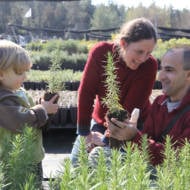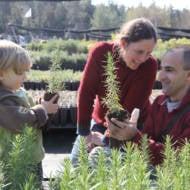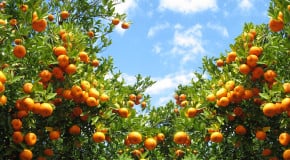
In Israel, it’s the New Year – for Trees!

In the Jewish world, Tu B’Shvat has become a celebration of fruit, particularly fruit from the Land of Israel.
By Rabbi Ari Enkin, Rabbinic Director, United with Israel
It’s time again to celebrate Tu B’Shvat – the New Year for Trees. That’s right. It’s not just Rosh Hashana that is the Jewish New year, we actually have four new years!
Although this New Year for Trees is not mentioned anywhere in the Torah, it is mandated by the Talmud.
As the Talmud says: “There are four new years. On the first of Nisan is the new year for kings and for festivals. On the first of Elul is the new year for the tithe of animals…On the 1st of Tishrei is the new year for the annual count…On the 1st of Shvat is the new year for the trees, according to Beit Shammai, but Beit Hillel says it is on the 15th of Shvat.”
The law is in accordance with Beit Hillel, and hence, the New Year for Trees is observed on the 15th of Shvat. The word “Tu B’shvat” means “the 15th of Shvat” – so it is less likely to forget the date.
The New Year for Trees is truly relevant only from the perspective of biblical agricultural law, which is not even practiced nowadays outside of the Land of Israel. The idea of having a new year for trees has been called the “fiscal year” for trees and their fruits. To make a long story short, fruits picked before the 15th of Shvat are considered to be from “last year,” while fruits picked from that date onward are considered to be “new.”
Since, as mentioned, agricultural laws have little practical relevance today, Tu B’Shvat has become a celebration of fruit, particularly fruit from the Land of Israel. As such, grapes, figs, pomegranates, dates, wine, cake (wheat!) and other fruits and fruit products are on the menu of the day. Many people make an effort to eat dozens of different types of fruits.
There are many kabbalistic interpretations for this custom. Indeed, Tu B’Shvat has become a very mystical and spiritual holiday most widely observed by hasidic and Sephardic Jews who emphasize kabbalistic teachings in their lives.
Trees are often used as a metaphor for humans. As the Torah says (Deut 20:19), “When you lay siege to a city for many days to capture it by making war against it, you shall not destroy its tree, wielding an axe against it; for you shall eat of it but not cut it down; for man is a tree of the field…”
Why does the Torah call man a tree? What is the connection?
Among the many answers given is that just as we eat from the fruits of a tree, so we are supposed to “eat” from the wisdom and knowledge of others. Just as trees sustain mankind with refreshing fruit, clean air, beauty, and in so many other ways, we too we should sustain our fellow people by being good to one another, offering assistance, goodwill, and brotherhood – to be a “refreshing” source of friendship and inspiration to all we meet. Happy New Year!
CELEBRATE ISRAEL’S NEW YEAR FOR TREES – BUY FRUIT TREES!
ISRAELI FARMERS NEED YOUR SUPPORT DURING SHMITA
During the current Sabbatical Year (Shmita), observant Israeli farmers stop working and lose income for an entire year. By ordering trees now, farmers get immediate financial relief and will plant your trees right after Shmita.
“…I will ordain My blessing for you…”
(Leviticus 25:4,21)
HELP ISRAEL FARMERS TODAY AND SHARE IN THE BLESSING OF THE SABBATICAL!
The post In Israel, it’s the New Year – for Trees! first appeared on United with Israel.
United with Israel
